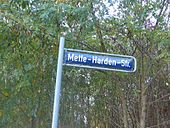Mette Harden
Mette Harden (* probably around 1570 in Kirchwerder ; † after 1612 there ) was a German woman who was accused of witchcraft .
history
After the farmer Joachim Witte from Kirchwerder had accused the bailiff Peter Lütken of alleged defamation, a process before the district court of Hamburg followed . The governor, for his part, accused Witte of having committed sorcery and theft. Witte made a confession under torture , but at the same time accused three women of having worked magic spells with him . He also counted Mette Harden among the women. Harden had a motive for the crime because the governor allegedly had Harden's son prosecuted for an alleged manslaughter.
Mette Harden, who belonged to the lower classes of the population, was then arrested and tortured together with two other women (Cathrin Danckwers from Kirchwerder and Cathrin Schmalfeldes from Curslack) in 1612. Harden did not confess and insisted on being innocent. The case was then tried again before the Lübeck Higher Court . The judges found procedural errors by the regional court. They also criticized the fact that only one witness had been heard. Mette Harden and the two other women were then released. Also because Witte did not retract his allegations, the population of Kirchwerder continued to view the women as guilty. The locals attacked the women they believed were witches and insisted that they be punished or expelled. The High Court did not comply with the popular request and instead fined the prosecutors for the ongoing tumult.
Until the last trials of alleged witches in Hamburg in 1678, Joachim Witte was the only man charged with witchcraft.
Commemoration
Mette-Harden-Strasse in Kirchwerder has been named after Mette Harden since 1995 .
On June 7, 2015, the Association of Women’s Garden in the presence of the second mayor of Hamburg, Ms. Katharina Fegebank , inaugurated a memorial stone in the Ohlsdorf cemetery for all those women who were victims of the early modern witch hunt in Hamburg.
See also
literature
- Ariane Knuth: Harden, Mette . In: Franklin Kopitzsch, Dirk Brietzke (Hrsg.): Hamburgische Biographie . tape 3 . Wallstein, Göttingen 2006, ISBN 3-8353-0081-4 , p. 153 .
- Dagmar Unverhau: uprising and rebellion in the Bergedorf office because of a magician and three sorceresses in 1612 . PDF 3 MB, accessed May 22, 2016
- Rita Bake , Andre Orth and Birgit Kiupel: Who is behind it: Streets, squares and bridges in Hamburg named after women. 2011.
Individual evidence
- ↑ Dagmar Unverhau: Riot and rebellion in the Bergedorf office because of a magician and three sorceresses in 1612 , p. 5. PDF 3 MB, accessed May 22, 2016
- ↑ http://www.bergedorf-chronik.de/strassen/html/M0378.html
- ↑ Rita Bake: A new memorial stone in the women's garden . In: OHLSDORF - magazine for mourning culture
- ↑ Fegebank dedicates stone in memory of burned witches
- ↑ Memorial stone for Abelke Bleken
- ↑ Speech on the occasion of the inauguration of Hamburg's first memorial stone for the women accused of being witches and burned in Hamburg
| personal data | |
|---|---|
| SURNAME | Harden, Mette |
| BRIEF DESCRIPTION | German maid and supposed witch |
| DATE OF BIRTH | around 1570 |
| PLACE OF BIRTH | Kirchwerder |
| DATE OF DEATH | after 1612 |
| Place of death | Kirchwerder |
